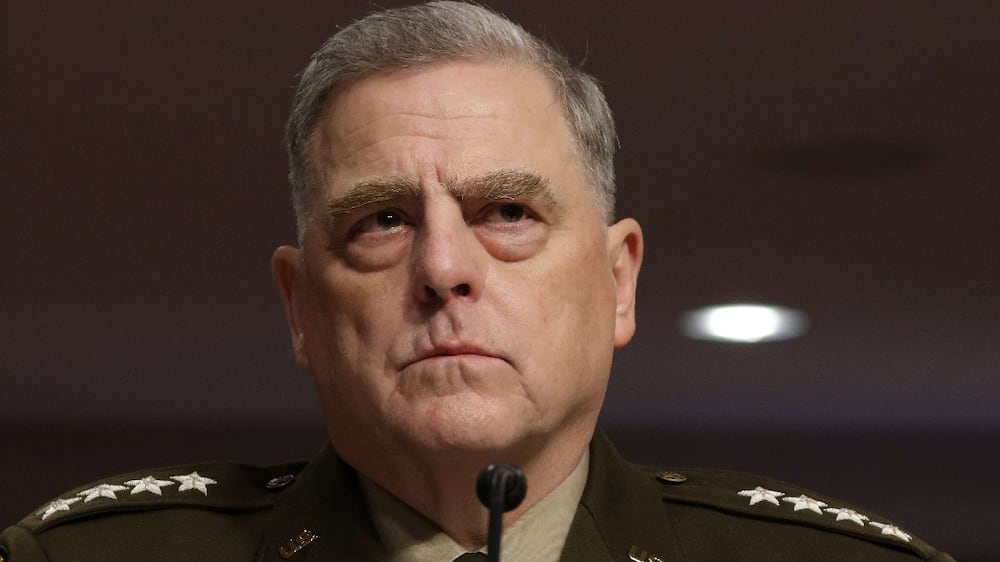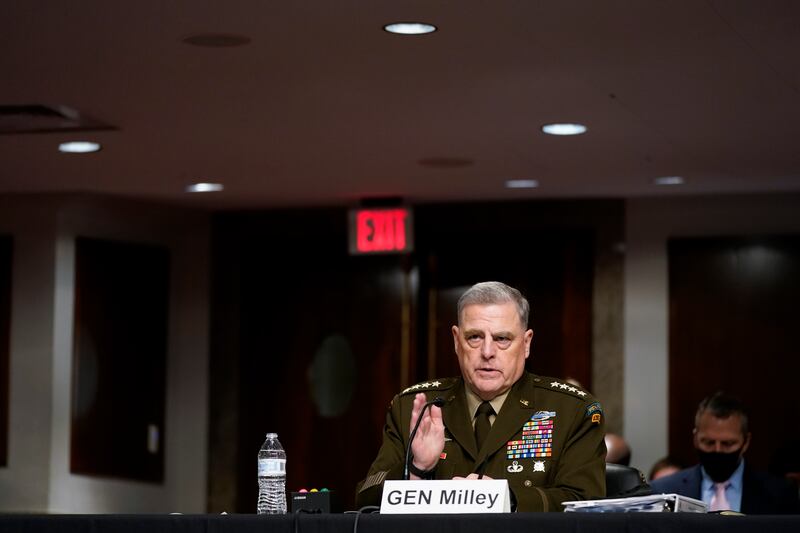The US military's top officer says he was ordered to accelerate the withdrawal of US troops from Afghanistan under the administration of Donald Trump, just days after the former president's 2020 election defeat.
Gen Mark Milley, the chairman of the joint chiefs of staff, told Congress on Tuesday that the order initially stipulated a complete withdrawal of US troops by January 15, only five days before President Joe Biden's inauguration.
The revelation is significant because the question of what went wrong in Afghanistan over 20 years and the politicisation of the chaotic final days of the US occupation is shaping up to be a defining issue in next year's midterm elections and the 2024 presidential race.
Mr Trump has blasted his successor for the botched end to America's longest war, even though he initially agreed the terms of the US withdrawal in a generous deal for the Taliban, sealed in Doha in 2020.
Under that agreement, the US was supposed to quit Afghanistan by May this year. The new order would have hastened that withdrawal by several months.
But the order for a January withdrawal was rescinded after one week and Mr Trump opted to halve the number of US troops in Afghanistan – an alternative plan initially recommended by former defence secretary Mark Esper on November 9, the same day that the former president fired him.
“After further discussion regarding the risks associated with such a withdrawal, the order was rescinded,” Gen Milley told the Senate Armed Services Committee.
“On 17 November, we received a new order, to reduce levels to 2,500 plus enabling forces no later than 15 January.”
After taking office, Mr Biden quickly proceeded with Mr Trump’s plan for a full Afghanistan withdrawal – but he pushed the final departure date to the end of August.
Mr Trump initially called Mr Biden’s Afghanistan withdrawal “a wonderful and positive thing to do” but faulted the sitting commander-in-chief for extending the date past the initial May 1 deadline.
During his testimony, Gen Milley said the 2020 Doha agreement affected the morale of the Afghan forces and characterised the pull-out as “a 10-year, multi-administration withdrawal”.
As the Taliban seized power in August and the Biden administration struggled to evacuate US citizens and visa holders, Mr Trump went on to call the departure “the greatest foreign policy humiliation” in US history.
Asked by Tom Cotton, a Republican senator, why he didn't resign over the issue, Gen Milley said generals must follow the president's decisions regardless of whether they agreed.
“The president doesn't have to agree with advice just because we're generals,” Gen Milley said. “This country doesn't want generals to figure out which orders we're going to follow or not.”
Milley rejects idea of resigning over Afghanistan orders: 'I'm not going to turn my back on them'

Political blame games aside, Gen Milley and Gen Kenneth McKenzie, head of US Central Command, said they had assessed under both the Trump and Biden administrations that a full withdrawal would spark a collapse of the Afghan government.
“My analysis was that an accelerated withdrawal without meeting specific and necessary conditions risks losing the substantial gains made in Afghanistan, damaging US worldwide credibility and could precipitate a general collapse of the [Afghan National Security Forces]and the Afghan government, resulting in a complete Taliban takeover or general civil war,” Gen Milley said.
“That was a year ago. My assessment remained consistent throughout.”
Contrary to Gen Milley’s assessment, Mr Biden said in July that “the Taliban overrunning everything and owning the whole country is highly unlikely” and denied intelligence reports indicating the Afghan government would collapse following a US withdrawal.
But Gen McKenzie told Congress he had reached the same conclusion as Gen Milley.
“I recommended that we maintain 2,500 troops in Afghanistan,” Gen McKenzie told the Senate.
“I also had a view that the withdrawal of those forces would lead inevitably to the collapse of the Afghan military forces and eventually the Afghan government.”
The testimony contradicts what Mr Biden said in an August interview with ABC News, when he claimed his top military officials had not recommended that he keep 2,500 troops in Afghanistan.
Gen Milley briefly described why he felt Afghanistan's police and military forces crumbled even faster than the US intelligence community and military officials had anticipated.
“We made them too dependent on our technology, too dependent on our capabilities,” he said. “We didn’t take in the cultural aspects perhaps as much as we should have.”







